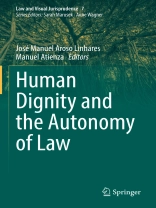This book intertwines two major themes in contemporary legal theory – the concepts of human dignity and the problem of the autonomy and limits of the law – while also addressing two other key aspects – the first one concerned with human rights practices and foundations (in their direct connections with the issue of dignity), the second one considering the role that the law’s aspirations attribute to the experience of an autonomous subject-person (and the demands that identify his/her position in the dialectical counterpoint with the rethinking of a community). The diversity of perspectives that each of these themes allows is explored in various contexts and with unmistakable implications concerning juridical validity, rule of law practices, pluralism, political and practical-cultural challenges, and divisive “bio-ethical” issues. This means considering the separation or separability theses between law and morality and the juridically relevant experience of person(hood) as a dialectic between autonomy and responsibility, the orthodox and heterodox images of comparable concreteness and incomparable singularity, the challenges of external points of view and interdisciplinary approaches.
Mục lục
Dignity / Autonomy of the Law / Human Rights / Comparable Personal Autonomies: Introducing an Indispensable
Generating Series (and its Productive “Phantoms”).-
Part 1 Exploring the “Conceptual Bonds” between Human Rights and Human Dignity .- From Human Rights to Human Dignity and vice versa.- Models of Consensus and Compromise on Human Rights and Dignity.- The Foundation of Human Rights, Dignity or Autonomy?.-
Part 2
Exploring the Problem of The Autonomy of Law in the Trends of Contemporary Legal Discourse(s) .- Hart, Raz and Kelsen on the Puzzle of Law’s Autonomy.- Constructivist Metaphors and Law´s Autonomy in Legal Post-Positivism.-
Part 3 Intertwining the Claim to Autonomy and the Concept of Human Dignity .- Merit, Value and Justification: Human Dignity vis-à-vis Legal (Inter)subjectivity – The Autonomy of Subjects Within the Autonomy of Law.- Between Principles and Rules. An itinerary around Law’s Morality and Human Dignity.- The Legal Meaning of Human Dignity: Respect for Autonomy and Concern for Vulnerability.-
Part 4 Dialogues with Emmanuel Levinas .- The Double Sense of the Law-Dignity Relationship in Emmanuel Levinas.- Human Rights, Rights of The Other, and Preventive Peace. A Levinasian perspective.-
Part 5 Dialogues with Jeremy Waldron .- No Argument: Human Dignity and The Making of Legislation.- Is dignity a noncontingent autonomously juridical “idea”? A conversation piece with Jeremy Waldron.-
Part 6 Exploring Human Dignity in the Boundaries of Law .- Does Dignity Promote Law’s Autonomy or Undermine It? The Israeli Controversy.- Images and Counter-images of
humanitas: A
Jusaesthetic Approach to the Problem of Law’s Normative Validity: Beyond the Blindness-and-Sightedness Polarity.
Giới thiệu về tác giả
José Manuel Aroso Linhares is a Full Professor of Legal Theory, Methodology and Philosophy of Law (as well as of Introduction to Law) at the Faculty of Law, University of Coimbra (Portugal). He is the Coordinator of UCILe R (the University of Coimbra Institute for Legal Research) and the Vice-President of the Portuguese Section of the IVR (Associação Portuguesa de Teoria do Direito, Filosofia do Direito e Filosofia Social). His current research interests include the theory of evidence, narrative rationality, intercultural dialogue, judge-made law, law’s claim to autonomy, inclusive positivism, law and literature, law and music, political correctness. He is the author of several monographs and essays.
Manuel Atienza is a Full Professor of Legal Philosophy at the University of Alicante (Spain). He was vice-president of the International Association for the Philosophy of Law and Social Philosophy (IVR). He has written many books and articles on different topicssuch as the theory of legal statements, Marxism and law, bioethics, theory of legislation and legal argumentation.












